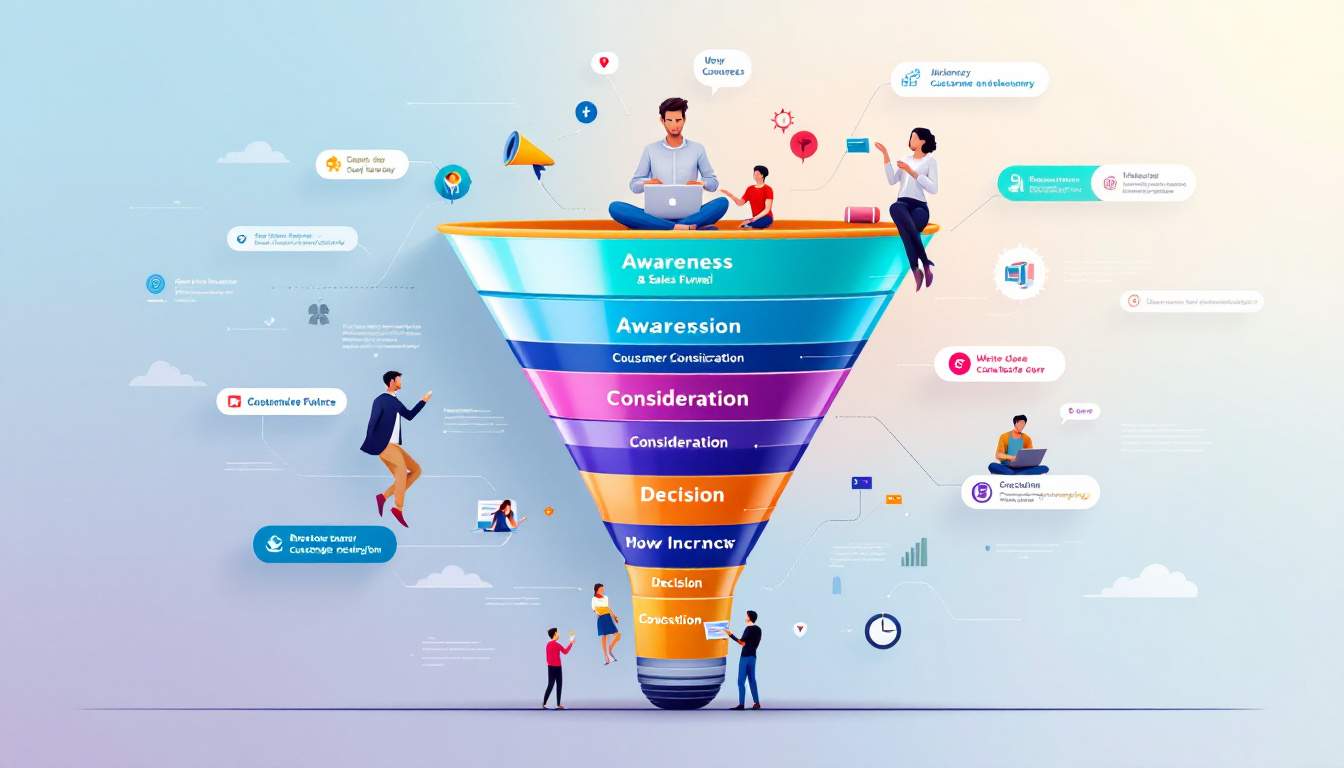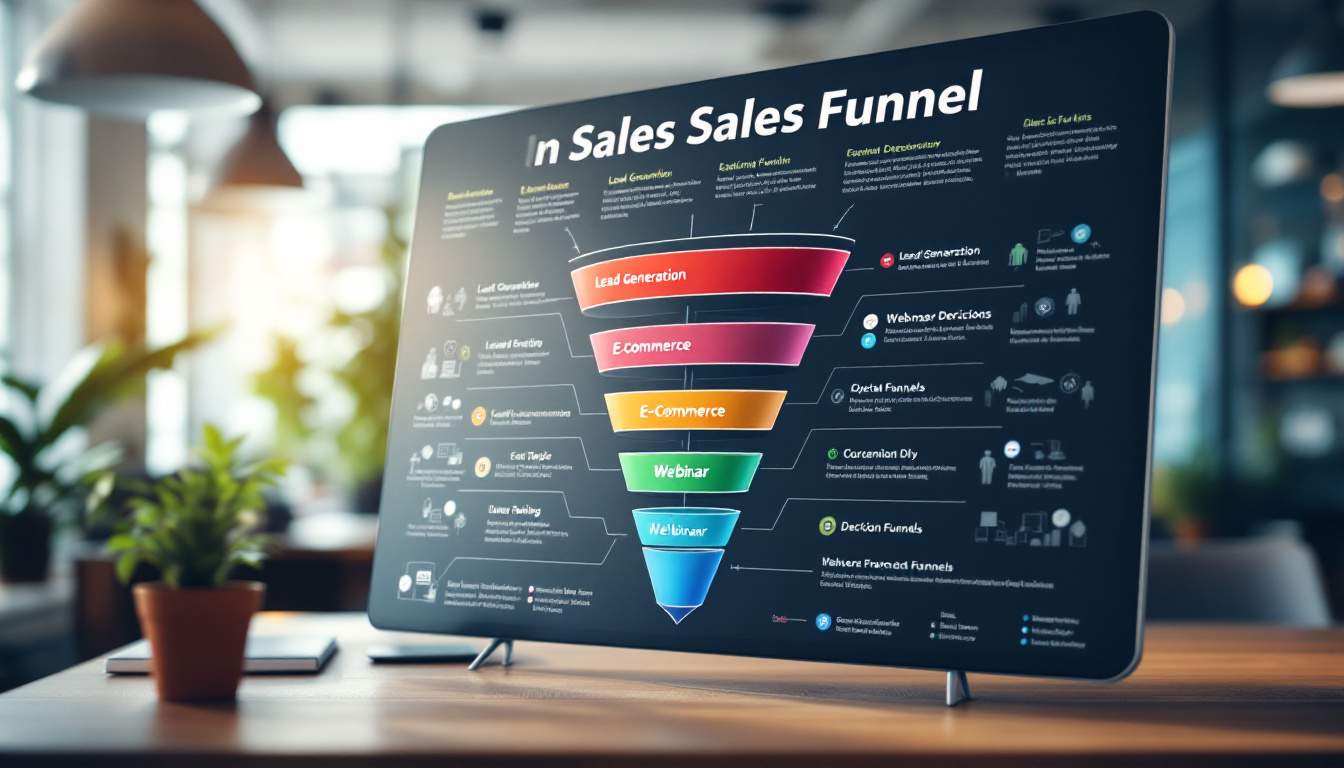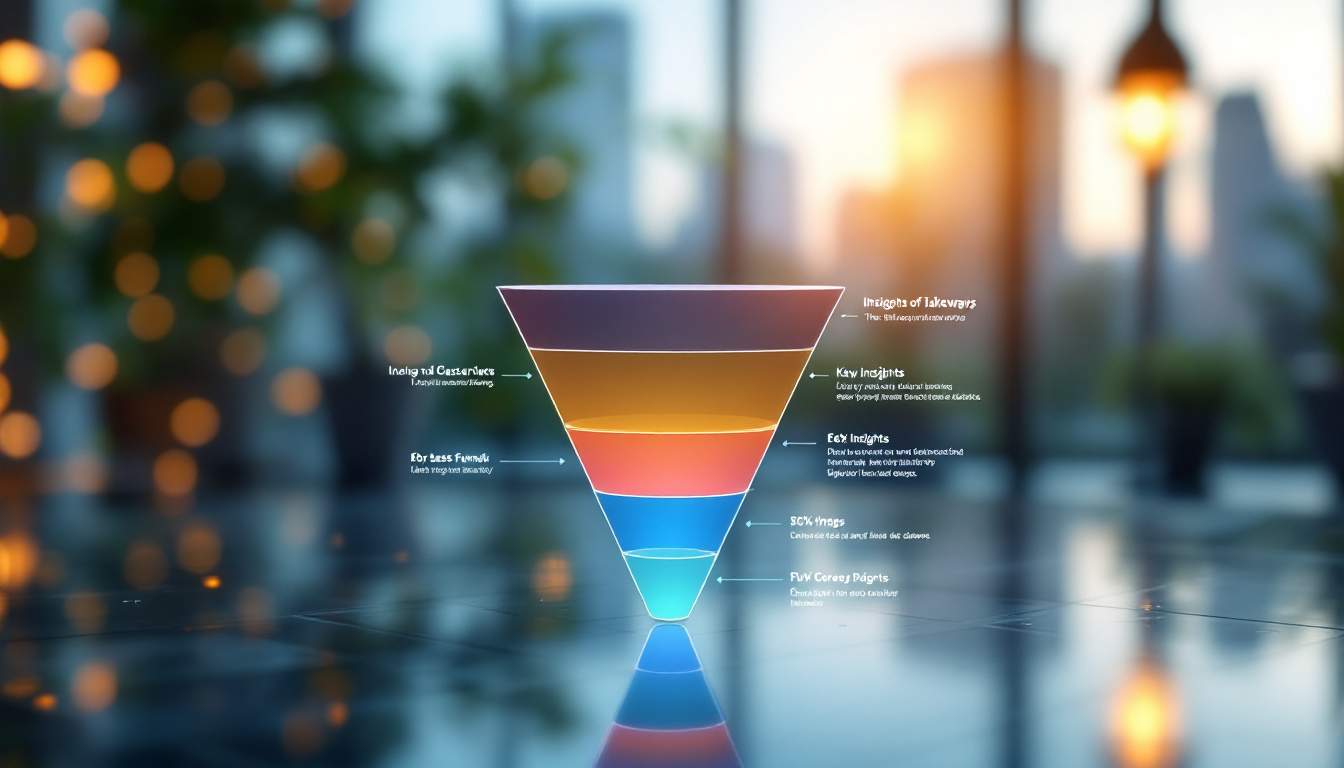What is a sales funnel?
The term “sales funnel” is a metaphorical representation of the customer journey from the initial stage of awareness about a product or service to the final stage of making a purchase. The funnel shape signifies the gradual narrowing down of potential customers as they progress through the stages of the sales process.
The sales funnel is a strategic tool used by marketers to understand and optimize the buying process. It helps businesses identify potential gaps in their sales process where prospective customers may drop off and not convert into actual buyers. By understanding these gaps, businesses can devise strategies to improve their conversion rates and increase sales.
The Stages of the Sales Funnel
The sales funnel is typically divided into four main stages: Awareness, Interest, Decision, and Action. Each stage represents a different phase in the buyer’s journey and requires different marketing strategies to move the potential customer to the next stage.

It’s important to note that not all prospects will make it to the final stage of the funnel. Some may drop off at various points in the process. The goal of the marketer is to maximize the number of prospects who reach the end of the funnel and become customers.
Awareness
The first stage of the sales funnel is the Awareness stage. This is when the potential customer first becomes aware of your product or service. They might learn about your business through a search engine, social media, a blog post, an advertisement, or a word-of-mouth recommendation.
At this stage, the goal is to capture the attention of the prospect and make them aware of your offering. This can be achieved through various marketing strategies such as content marketing, search engine optimization, social media marketing, and advertising.
Interest
The second stage of the sales funnel is the Interest stage. At this point, the prospect has shown some interest in your product or service and is actively seeking more information. They might visit your website, follow your social media accounts, or sign up for your newsletter.
The goal at this stage is to nurture the prospect’s interest and build a relationship with them. This can be done through email marketing, providing valuable content, and engaging with them on social media.
Decision
The third stage of the sales funnel is the Decision stage. Here, the prospect is considering whether to purchase your product or service. They might compare your offering with those of your competitors, read reviews, or seek advice from others.
The goal at this stage is to convince the prospect that your product or service is the best choice. This can be achieved through product demonstrations, testimonials, case studies, and special offers.
Action
The final stage of the sales funnel is the Action stage. This is when the prospect makes the decision to purchase your product or service. They might add your product to their shopping cart, fill out a form, or contact your sales team.
The goal at this stage is to make the buying process as easy and frictionless as possible. This can be done through a user-friendly website, clear and concise communication, and excellent customer service.
Importance of the Sales Funnel
The sales funnel is a vital tool in understanding and optimizing the customer journey. It provides a structured approach to guide potential customers through the buying process and helps businesses identify areas where they can improve their marketing strategies to increase conversions and sales.
By understanding the sales funnel, businesses can better align their marketing efforts with the needs and behaviors of their customers at each stage of the buying process. This can lead to more effective marketing campaigns, improved customer relationships, and ultimately, increased sales.
Conversion Rate Optimization
One of the key benefits of understanding the sales funnel is the ability to optimize for conversions. Conversion rate optimization (CRO) is the process of increasing the percentage of website visitors who complete a desired action, such as making a purchase or filling out a form.
By identifying where prospects are dropping off in the sales funnel, businesses can implement strategies to improve these areas and increase their conversion rates. This could involve improving website design, creating more engaging content, or offering more compelling incentives to purchase.
Customer Relationship Management
The sales funnel also plays a crucial role in customer relationship management (CRM). By understanding the stages of the sales funnel, businesses can better manage their relationships with customers and potential customers.
For example, businesses can use the sales funnel to identify potential customers who are at the Interest stage and then target these individuals with personalized marketing messages to nurture their interest and move them to the Decision stage. Similarly, businesses can use the sales funnel to identify customers who have reached the Action stage and then focus on providing excellent customer service to ensure a positive buying experience and encourage repeat purchases.
Types of Sales Funnels
While the basic structure of the sales funnel remains the same, there are different types of sales funnels that businesses can use depending on their specific needs and goals. These include the traditional sales funnel, the digital sales funnel, and the e-commerce sales funnel.

Each type of sales funnel has its own unique characteristics and requires different marketing strategies. However, all sales funnels share the common goal of guiding potential customers through the buying process and converting them into actual customers.
Traditional Sales Funnel
The traditional sales funnel is the original model that has been used by businesses for decades. It involves a linear process where prospects move through the stages of Awareness, Interest, Decision, and Action in a sequential manner.
This type of sales funnel is often used in industries where the buying process is more complex and requires more time and consideration, such as B2B sales or high-ticket items. The focus is on building relationships with prospects and guiding them through the buying process over a longer period of time.
Digital Sales Funnel
The digital sales funnel is a more modern version of the sales funnel that has evolved with the rise of digital marketing. It involves a more dynamic and interactive process where prospects can move through the stages of the funnel in a non-linear manner.
This type of sales funnel is often used in industries where the buying process is more straightforward and can be completed online, such as e-commerce or digital products. The focus is on attracting and converting prospects through digital marketing strategies such as SEO, social media marketing, and email marketing.
E-commerce Sales Funnel
The e-commerce sales funnel is a specific type of digital sales funnel that is used by online retailers. It involves a streamlined process where prospects can move from the Awareness stage to the Action stage in a relatively short amount of time.
This type of sales funnel is designed to optimize the online shopping experience and encourage quick conversions. The focus is on creating a user-friendly website, providing detailed product information, and offering a seamless checkout process.
Implementing a Sales Funnel
Implementing a sales funnel in your business involves a strategic process of understanding your customer’s journey, identifying the stages of the sales funnel, and aligning your marketing strategies with each stage. It requires a deep understanding of your target audience, your product or service, and your marketing goals.
The first step in implementing a sales funnel is to map out the customer journey. This involves identifying the steps that a customer takes from the moment they first become aware of your product or service to the moment they make a purchase. This can be done through market research, customer surveys, and data analysis.
Identifying the Stages
Once you have mapped out the customer journey, the next step is to identify the stages of the sales funnel. This involves breaking down the customer journey into the four main stages of Awareness, Interest, Decision, and Action. Each stage represents a different phase in the customer’s buying process and requires a different marketing strategy.
For example, during the Awareness stage, your marketing strategy might focus on attracting new prospects through SEO and content marketing. During the Interest stage, your strategy might focus on nurturing these prospects through email marketing and social media engagement. During the Decision stage, your strategy might focus on convincing these prospects to choose your product or service through product demonstrations and testimonials. And during the Action stage, your strategy might focus on making the buying process as easy and frictionless as possible through a user-friendly website and excellent customer service.
Aligning Marketing Strategies
The final step in implementing a sales funnel is to align your marketing strategies with each stage of the funnel. This involves creating a comprehensive marketing plan that outlines the specific tactics you will use to attract, nurture, convince, and convert your prospects.
This could involve a variety of marketing strategies, including content marketing, SEO, social media marketing, email marketing, advertising, product demonstrations, testimonials, special offers, website design, and customer service. The key is to ensure that your marketing strategies are tailored to the needs and behaviors of your prospects at each stage of the sales funnel.
Conclusion
The sales funnel is a powerful tool that can help businesses understand and optimize the customer journey. By implementing a sales funnel, businesses can create more effective marketing strategies, improve their conversion rates, and increase their sales.

Whether you’re a small business owner, a marketing professional, or a student studying marketing, understanding the sales funnel is crucial for success in today’s competitive business environment. So take the time to study the sales funnel, implement it in your business, and watch your sales soar!